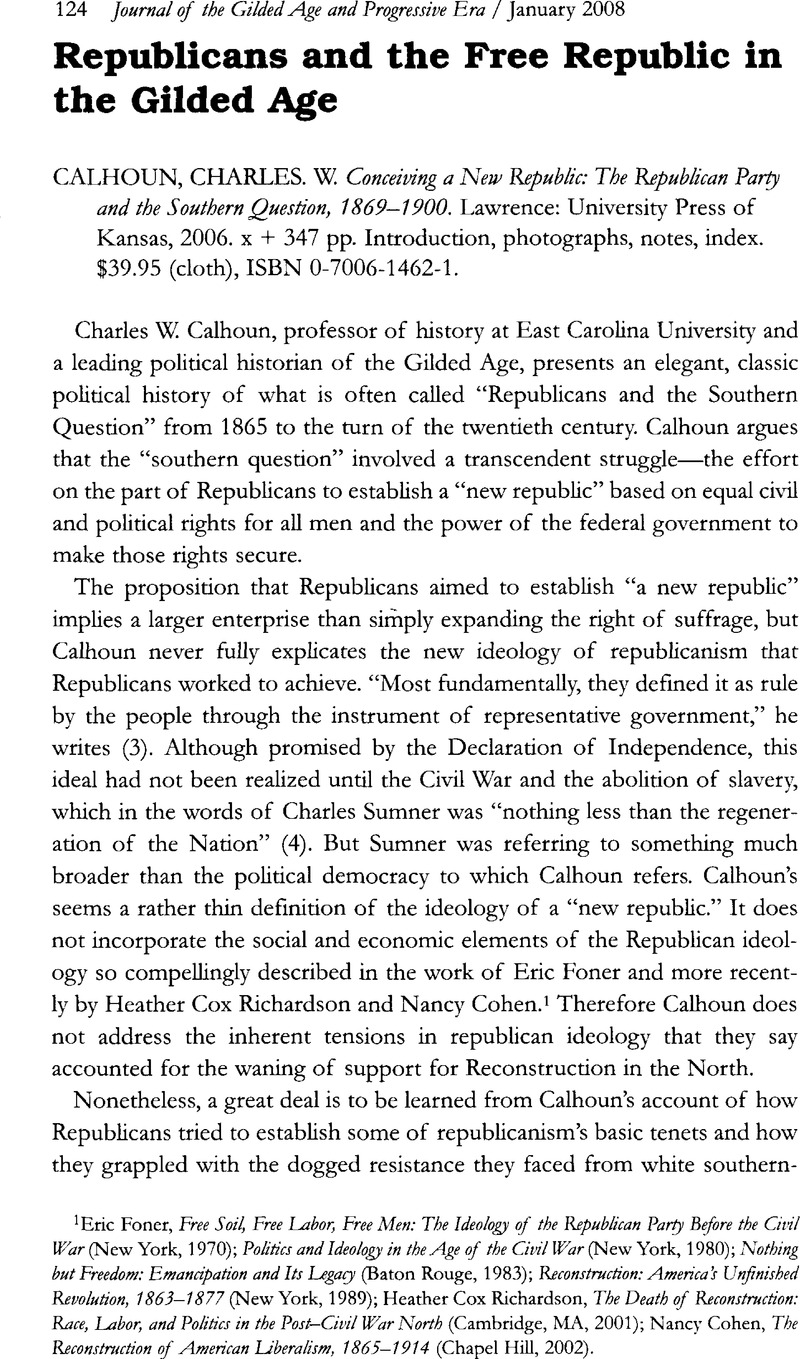No CrossRef data available.
Article contents
Republicans and the Free Republic in the Gilded Age - Charles. W. Calhoun Conceiving a New Republic: The Republican Party and the Southern Question, 1869–1900. Lawrence: University Press of Kansas, 2006. x + 347 pp. Introduction, photographs, notes, index. $39.95 (cloth), ISBN 0-7006-1462-1.
Published online by Cambridge University Press: 08 November 2010
Abstract

- Type
- Books Reviews
- Information
- The Journal of the Gilded Age and Progressive Era , Volume 7 , Issue 1 , January 2008 , pp. 124 - 127
- Copyright
- Copyright © Society for Historians of the Gilded Age and Progressive Era 2008
References
1 Foner, Eric, Free Soil, Free Labor, Free Men: The Ideology of the Republican Party Before the Civil War (New York, 1970)Google Scholar; Politics and Ideology in the Age of the Civil War (New York, 1980)Google Scholar; Nothing butFreedom: Emancipation and Its Legacy (Baton Rouge, 1983)Google Scholar; Reconstruction: America's Unfinished Revolution, 1863-1877 (New York, 1989)Google Scholar; Heather Cox Richardson, The Death of Reconstruction: Race, Labor, and Politics in the Post-Civil War North (Cambridge, MA, 2001)Google Scholar; Cohen, Nancy, The Reconstruction of American Liberalism, 1865-1914 (Chapel Hill, 2002)Google Scholar.
2 Fehrenbacher, Don E., The Slaveholding Kepublic: An Account of the United States Government's Relations to Slavery, comp. and ed. McAfee, Ward M. (New York, 2001).Google Scholar
3 Simpson, Brooks D., The Reconstruction Presidents (Lawrence, KS, 1998), 133–98Google Scholar. Calhoun's and Simpson's accounts contrast with those of Gillette, William and McFeely, William S., who ascribe the retreat from Reconstruction to northern—and Grant's own—racism. Gillette, Retreatfrom Reconstruction, 1869-1879 (Baton Rouge, 1979)Google Scholar; , McFeely, Grant: A Biography (New York, 1981)Google Scholar.
4 Blight, David W., Race and Reunion: The Civil War in American Memory (Cambridge, MA, 2001).Google Scholar
5 DeSantis, Vincent, Republicans Face the Southern Question: The New Departure Years, 1877-1897 (Baltimore, 1959)Google Scholar; Hirshson, Stanley P., Farewell to the Bloody Shirt: Northern Republicans and the Southern Negro, 1877-1893 (Bloomington, IN, 1962); XiGoogle Scholar, Wang, The Trial of Democracy: black Suffrage and Northern Republicans, 1860-1910 (Athens, GA, 1997)Google Scholar. See also Benedict, Michael Les, “Reform Republicans and the Retreat from Reconstruction,” in The Facts of Reconstruction: Essays in Honor of John Hope Franklin, ed. Moss, Alfred and Anderson, Eric (Baton Rouge, 1991), 53–78Google Scholar, revised version in Benedict, Preserving the Constitution: Essays on Politics and the Constitution During the Civil War Era (New York, 2006), 168–85Google Scholar.




